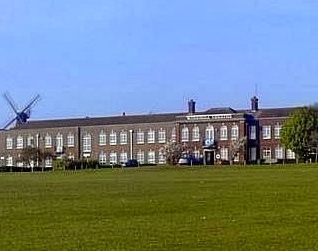Inspectors have praised Blatchington Mill School in a report by the official watchdog Ofsted.
One of them, Ofsted inspector Caroline Walshe, said: “The visit was the first short inspection carried out since the school was judged to be good in February 2013.”
In a letter to head teacher Ashley Harrold she wrote: “This school continues to be good. The leadership team has maintained the good quality of education in the school since the last inspection.
“Leaders and staff share a clear understanding of the school’s strengths and how to improve it further.
“You are a very reflective leader and, with the leadership team, you analyse and make careful and effective use of information to promote and track improvements.
“Leaders and the governing body accurately identify areas to improve while regularly reviewing the effectiveness of the actions that leaders and staff take. Governors support leaders well.
“There is a very honest relationship between your governing body and your leadership team and this promotes improvement well.
“Leaders have established a culture and ethos which is inclusive, caring and which fosters pupils’ good achievement. Pupils and parents recognise how the staff team supports and nurtures pupils well to succeed.

“Leaders have created a calm and well-organised school where pupils are safe. Relationships between pupils are strong because all are taught to respect one another and diversity is celebrated.
“Pupils told us that your focus on rewarding pupils’ positive behaviour is encouraging more pupils to do the right thing.
“These actions have created powerful and positive working relationships between staff and pupils. As a result, most parents would recommend this school to others.
“Effective leadership of teaching means that the vast majority of pupils make good progress. This includes disadvantaged pupils.
“You rightly identify the strengths in middle leadership in English, mathematics and science as some of the main drivers in improving teaching and pupils’ achievement.
“The majority of pupils achieve well and attain outcomes that compare favourably with pupils nationally who have similar starting points.
“However, pupils who have special educational needs and/or disabilities could do better in some subjects.
“GCSE results have improved significantly since the last inspection, in most subjects. This is because staff now use assessment information well to check pupils’ learning and match activities well to their different needs.

“The arrangements for safeguarding are effective. Pupils are taught well how to stay safe and say that they feel safe in school. Parents agree their children are well cared for and are safe at the school. There is a strong safeguarding culture.
“During the inspection, inspectors looked closely at safeguarding arrangements and pupils’ attendance.
“You correctly identified that the attendance of the disadvantaged pupils and those who have special educational needs and/or disabilities needs to improve further.
“You have strengthened the leadership of this area and ensured that all pupils are rewarded with ‘passport’ points for attending school.
“This is beginning to have a positive effect on vulnerable pupils and some pupils’ attendance has improved as a result.
“Your leader responsible for special educational needs has identified the barriers affecting some pupils who have special educational needs and/or disabilities and created bespoke support programmes to improve their attendance.
“This is helping them attend school more often and is reducing persistent absence. However, you recognise that there is still work to be done to further improve the attendance of these vulnerable groups of pupils.

“Leaders responsible for the sixth form have adjusted the curriculum to include more vocational qualifications to match the needs of all the students and the local community.
“Sixth form leaders have helpfully analysed why students do particularly well in some subjects and not in others, in order to identify and share best practice and bring about improvements.
“Subject teachers are increasingly precise in the way they help students to improve their work. This is improving pupils’ achievement in many subjects.
“Students appreciate the support they receive from the sixth form team but more remains to be done to improve the progress A-level students make from their starting points at the end of Year 11.”
The report said that the “next steps for the school” should include leaders and governors ensuring that
• attendance improves for disadvantaged pupils and pupils who have special educational needs and/or disabilities
• more students following A-level courses make progress similar to those nationally who have the same starting points at the end of Year 11
• more pupils who have special educational needs and/or disabilities make suitable rates of progress in English and humanities
Mr Harrold wrote to parents: “We’re very proud of the inspection and the praise they had for so many aspects of the school. The students were wonderful and came across so well.
“We’re also pleased that the inspectors agreed with us on the aspects of our provision that we’d like to improve further and didn’t find any aspects that we weren’t already improving.
“Personally, I am incredibly proud to work here and our school has a really wonderful atmosphere.
“I firmly believe that we really do get the best from so the young people in our care. I know they enjoy their learning and they go on to great things when they leave us.
“I also know how hard we work to get the best from students, from a caring, yet aspirational, perspective – and I would add that parents are a very important part of this too.”








